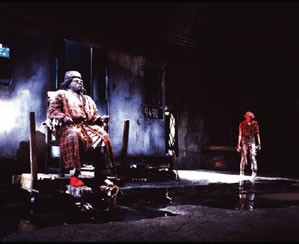So, at the end of our last installment, I was about to propound some deep thoughts on directorial
interpretation.
I went on and on about
Joanne Akalaitis’s version of “Endgame,” which deviated enough from Mr. Beckett’s
intentions that he sought to stop it in the courts. Failing there, he had a
note included in the program:
Any production of Endgame which ignores my stage directions
is completely unacceptable to me. My play requires an empty room and two small
windows. The American Repertory Theater production which dismisses my
directions is a complete parody of the play as conceived by me. Anybody who
cares for the work couldn't fail to be disgusted by this.
That would seem to have put an end
to it. The production got what I take to have been mixed reviews, and even if
Mr. Beckett wasn’t satisfied, everyone did make a case for their position.
Samuel Beckett at 70, but don't think he couldn't have taken you.
Mr. Beckett died in 1989, but his
estate has closely guarded productions of his work ever since – even ill-considered
ones (some of which shall go unnamed, given my potential readership; discretion indeed being the better part of valor …). So it was a surprise to me to find that, in 2009,
ART had once again attempted a production of “Endgame” – though by this
time, neither Ms. Akalaitis nor Mr. Brustein were on the premises, and ART was committed to
doing the play in exactly the way Mr. Beckett had intended. Director Marcus Stern
explained, "We had to sign a contract with the
estate that we'd stick absolutely to the letter of the script. We are literally
coloring inside clearly drawn lines by Beckett." Leaving that “literally”
aside, this is a point I’ll return to in a minute.
According to the Boston
Globe:
It's
not easy to pull off, says Stern, who at first thought the directions would be
limiting. But instead he says he finds it deeply challenging and exhilarating.
"It's
very labor intensive and really exhausting," he says. "The task is
really hyper-focused, but it's also very interesting getting the mechanics
down. Normally it would be frustrating, but there is a great faith he's such a
great writer that it will pay off to strictly adhere to his description."
Stern and his actors, "literally" coloring inside the lines.
I remember some actor – I think it was George C.
Scott, so I'll give him the credit – talking about how ridiculous it was
to give awards in the arts. Not only is it impossible to compare performances
in varied plays and movies (I mean, who gave a better performance? Kathy Bates
in “’Night, Mother,” Groucho Marx in “A Night at the Opera,” or Robert Preston
in “The Music Man?”) He felt the only real way to judge actors was to have
everyone play Hamlet and then decide who was best. And even then, it would be
purely subjective; there’s no empirical way to say that a performance is good, bad, or indifferent; it’s all up to the observer. We’ve all seen performances
that others raved about and left us shrugging and saying “What the hell was
that?”
Try to tell me this isn't the equivalent of Gielgud in "Hamlet" and you'll get an earful.
So, to get back to Mr. Stern’s
comment, we have to color inside the creator’s lines. Not only is it what’s
required legally, it’s also the only basis by which we can determine how closely
a production comes to the writer’s intentions. Yeah, you might think “South
Pacific” would make more sense if it were set on Mars, or that “The Farnsworth
Invention” (remember that one? From all those days ago?) would be better with a
different ending, but it’s not your decision to make. It’d be like walking into
someone’s house and saying “those walls would look better if they were bright
green” and painting them on your own volition. You might be right, but it’s not
up to you. You might think my new shirt would look better if the sleeves were
cut off, but if you try to do it, I’m probably gonna get pissed off and punch
you.





